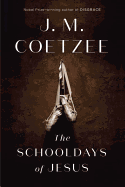
Having won the Nobel Prize, two Booker Prizes and cemented himself in the literary canon, one might expect J.M. Coetzee (The Childhood of Jesus) to slow down at the age of 76. Instead, he seems to be embarking upon one of his grandest projects. The Schooldays of Jesus is the second novel in a world that is best described as Kafka-esque, full of strange bureaucracy and even stranger mysticism.
David and his two caretakers, Simon and Ines, have fled the city of Novilla for the provincial town of Estrella. A nominal family, the bonds among the three become quickly frayed as David starts school at a prestigious academy of dance, becoming enamored with his beautiful teacher and her strange philosophy, which Simon and Ines can make neither heads nor tails of. David is headstrong, and while not exactly fitting the picture of Jesus with which the title saddles him, he swimmingly takes to the academy's transcendental concepts, chiding Simon's lack of understanding without ever really explaining what is going on. There's a murder and a trial, but the plot is ancillary to the conversations between Simon and the rest of the cast. The Schooldays of Jesus is less about what happens to David and Simon and more about Simon's concerns as to how to raise the boy.
It's odd to say The Schooldays of Jesus argues that parenthood is much like a Kafka story. But, like Kafka's work, the novel illustrates the struggle of logic against the ineffable. In this case, what cannot be described is the internal life of the little creatures raised into adults. --Noah Cruickshank, adult engagement manager, the Field Museum, Chicago, Ill.

